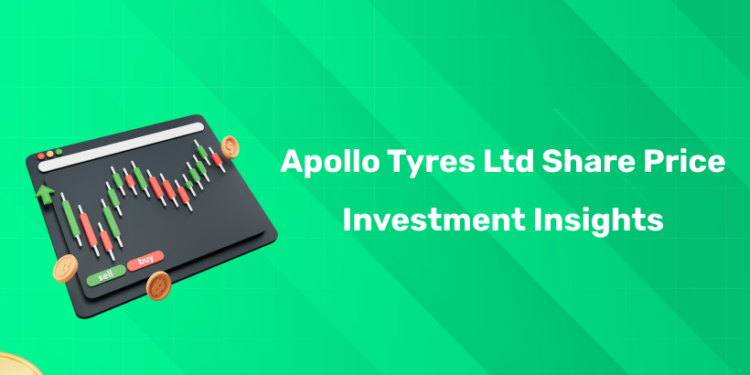Table of Contents
Introduction
When analysing the prospects of the Indian tyre‐maker Apollo Tyres Ltd and considering an investment, the theme “Apollo Tyres Ltd Share Price Investment Insights” becomes central. This blog delves into the company’s background, business model, financials and market context to arrive at actionable investment insights. By exploring these dimensions, you will gain a clearer view of how the share price could evolve, and what risks and opportunities lie ahead.
Learn Stock Marketing with a Share Trading Expert! Explore Here!
History of the Company
The following capture the company’s evolution:
- Incorporated in India in 1972, Apollo Tyres is headquartered in Gurgaon, Haryana.
- In 1975, its first manufacturing plant was commissioned in Perambra, Kerala.
- Expanded production in the country via several plants located in the states Kerala, Gujarat, Tamil Nadu etc.
- Foray into global operations: acquired Netherlands-based tyre maker Vredestein Banden B.V. in 2009.
- Over the years, it expanded from manufacturing vehicle tyres to a vast product portfolio spanning passenger cars, trucks, agriculture and off-highway segments.
Business Model
- Manufacture and sale of tyres that includes passenger, truck & bus, off-road, agriculture and allied products.
- Combine domestic Indian operations with international manufacturing and sales (including Europe) catering to both original equipment manufacturers (OEM) and replacement markets.
- Emphasis on innovation, R&D, and a wide distribution network that supports scale and growth.
- Garners revenues through a mix of domestic and export markets, with India being the top contributor.
Leadership, Branding and Trust
- Leadership: A management and promoter group with rich experience has helped grow the business from a domestic player to an international tyre manufacturer.
- Branding: Strong brand recognition in India through the Apollo brand and in Europe via Vredestein and other product lines.
- Trust: Proven manufacturing credibility, global footprint, regulatory compliance, and expansion into new markets.
- Reputation: The company has grown to be one of the major global players in the tyre industry, which supports investor confidence.
Milestones and Achievements
- In 1975, commissioned its first plant in Kerala.
- Acquisition of Vredestein Banden B.V. in 2009, that kickstarted European footprint.
- Robust growth in domestic and international markets, diversified product portfolio across segments.
- Financial milestone: Full-year revenue for FY 24-25 rose to ₹26,123 crores (3% growth) across operations.
- Recognised global R&D investments and manufacturing footprint in India, Europe.
Recent Development
In 2025 September, Apollo Tyres bagged the lead sponsorship rights for India’s cricket teams. Following this latest development, the tyre maker will be the Indian cricket team’s new jersey sponsor for both men and women, senior and junior till March 2026.
According to news reports, Apollo entered into a deal with the Board of Control for Cricket in India (BCCI), that is believed to be worth Rs 579 crore. The other bidders for this deal were Canva and JK Cement, who had placed bids worth Rs 544 crore and Rs 477 crore respectively. Apparently, Apollo Tyres will be spending a whopping Rs 4.77 crore per match as part of this two-and-a-half-year deal. Prior to this, the Indian cricket team’s jersey sponsor was Dream11 which exited following the introduction of the Online Gaming Bill, 2025.
Competition in the Tyre Industry
Key competitors to Apollo Tyres include:
- MRF Ltd – large Indian tyre manufacturer with strong brand and market share.
- CEAT Ltd – another Indian tyre maker targeting both domestic and export markets.
- JK Tyre & Industries Ltd – competitor in various tyre segments in India.
- Other global players that impact pricing, raw material supply, and technology.
Apollo Tyres Ltd’s Share Price, Market Capitalisation and Related Details
| Metric | Value |
| Recent share price (approx) | ₹500 (indicative) |
| Market capitalisation | ₹31,742 crores (as per one estimate) |
| EPS (TTM) | ₹13.05 |
| Net profit margin (TTM) | 4.29% |
| Revenue growth FY25 | 3% growth to ₹26,123 crores |
Note: These numbers are indicative and subject to change with market movements, currency and accounting adjustments.
Financial Performance Overview
The financial snapshot shows:
- For FY 24-25, consolidated revenue rose about 3% to ₹26,123 crores.
- The company’s balance sheet shows total debt (approx) ₹4,410 crores for a recent year.
- Q1 FY26 results: Revenue in India operations and consolidated rose 4% year-on-year to ₹6,561 crores; net profit rose 26% to ₹381 crores (excluding exceptional items).
- However, in the earlier quarter (Q1 FY25-26) one source reports net profit fell 95% to ₹12.88 crores.
- Asset and liability structure: Tangible book value per share has been increasing (e.g., ₹217.22 in a recent year)
These figures feed into the “Apollo Tyres Ltd Share Price Investment Insights” by offering a picture of earnings, growth, debt, and margin trends.
Peer Comparison
| Company | Market Cap / Size | Growth & Key Metrics |
| Apollo Tyres Ltd | ₹31,742 crores | Revenue growth 3%, margin 4% |
| MRF Ltd | Larger market cap (₹67,938 crores) | Stronger brand, higher margins |
| CEAT Ltd | ₹16,749 crores | Faster growth in some periods, but higher risk |
This comparison contextualises the “Apollo Tyres Ltd Share Price Investment Insights” by showing how Apollo stands relative to peers in size, growth and profitability.
Challenges and Risk Management
When reviewing “Apollo Tyres Ltd Share Price Investment Insights”, some key risks and mitigating factors emerge:
- Raw material volatility: Tyre manufacturing, to a great extent relies on natural rubber, synthetic rubber, oil derivatives, which is subject to cost fluctuation.
- Margin pressure: With modest growth and relatively lesser profit margins (4%), small headwinds can make a dent on profitability.
- Global expansion risks: International operations come with currency risk, regulatory risk, and competition.
- Debt levels: While manageable, any sharp downturn could cause a stress on the balance sheet.
- Competitive intensity: A crowded domestic and global tyre markets, price wars and technological disruption such as EV tyres may pose threats.
- Strategy risk: Execution of the growth strategy and cost control will matter for the share price.
The company appears to address risks through diversified geography, R&D focus, multiple product segments and maintaining a balanced debt profile.
Future Outlook
From the “Apollo Tyres Ltd Share Price Investment Insights” perspective, future prospects include:
- Moderate growth expected in the replacement market, especially in the current scenario of India’s growing vehicle numbers and rising aftermarket demand.
- Potential export growth, especially in Europe and other markets, leveraging the Vredestein brand and manufacturing footprint.
- Product innovation: As vehicles evolve (electric vehicles, larger tyres, speciality tyres), opportunities arise for premium/ niche segments.
- Cost advantages: If raw material costs moderate or efficiencies improve, margins could expand.
- Share price catalyst: Improved earnings, margin expansion, and positive sector tailwinds could drive upward movement in the share.
- But growth may remain modest in the near term (3-5%) unless significant structural change takes place.
Hence, Apollo Tyres’ investment case is one of stable moderate growth with moderate risk, not a high-growth speculative bet but a measured industrial player.
Key Takeaways
- The “Apollo Tyres Ltd Share Price Investment Insights” reveal that Apollo Tyres is a well-established tyre manufacturer with global reach, diversified segments and an established brand.
- Financially, growth is modest (3 %) and margins are thin (4 %), meaning the share price may not spike dramatically unless business improvement occurs.
- Compared to peers, Apollo offers competitive position but faces strong competition, cost pressures and execution challenges.
- The share valuation appears to reflect this moderate growth profile and risk-reward scenario.
- For investors, the stock could be considered for exposure to the tyre/auto component sector, particularly if one expects replacement market growth and cost tailwinds, but it is not without risks.
- Monitoring raw material cost trends, margin improvement, debt levels, and expansion into premium/exports will be key to future upside.
- In summary, Apollo Tyres offers a balanced investment opportunity, modest growth, an established business, and manageable risk, subject to which the share price may deliver steady returns rather than dramatic upside.
Parting Words
Super excited to learn more about the world of share markets and stock analysis? All you need is a trusted training platform and a bunch of expert mentors to guide in the right direction. Since 2017, Entri Finacademy is offering stock market courses, right from the very basics to the advanced level. The highlight of this SEBI-compliant platform is that you can learn intraday, options, forex trading and mutual funds in a simple, easy-to -understand manner. Moreover, with over 9 million students across India and amazing features such as exclusive live classes, dedicated mentor support and doubt clearance sessions, Entri Finacademy is the perfect platform to learn stock markets. To know more about Entri’s courses, click here.
Stock Market Training Reviewed & Monitored by SEBI Registered RA
Trusted, concepts to help you grow with confidence. Enroll now and learn to start investing the right way.
Know moreFrequently Asked Questions
What does “Apollo Tyres Ltd Share Price Investment Insights” cover?
It covers analysis of business model, financials, market context and share price drivers for Apollo Tyres, to help investors assess the share.
Is Apollo Tyres a high-growth stock?
No, based on recent performance, the growth is modest (3%) and margins are thin, so it’s more of a steady industrial play than a high-growth stock.
What are the major risks for Apollo Tyres?
Major risks are raw material cost volatility, margin pressure, execution in global markets, and competitive intensity.
When compared to its peers, how is the performance of Apollo Tyres?
While Apollo is competitive and well-established, peers like MRF have higher margins or stronger brands in some segments. Apollo’s comparisons show moderate size and performance.
What could make the Apollo Tyres share price rise?
Margin improvements, cost control, successful expansion into premium/exports, favourable raw material trends and growth in aftermarket demand could drive the share price up.
Is the current market cap of Apollo Tyres reasonable for investors?
The market cap (₹31,000 crores) reflects moderate growth and risk; whether it’s reasonable depends on investor expectations for future performance and risk tolerance.
Should I buy the share now?
It depends on your investment horizon, risk appetite and expectations. If you’re looking for stable industrial exposure and believe the company can improve margins and grow modestly, you may consider this stock. On the other hand, If you seek high growth, this may not fit that profile.














